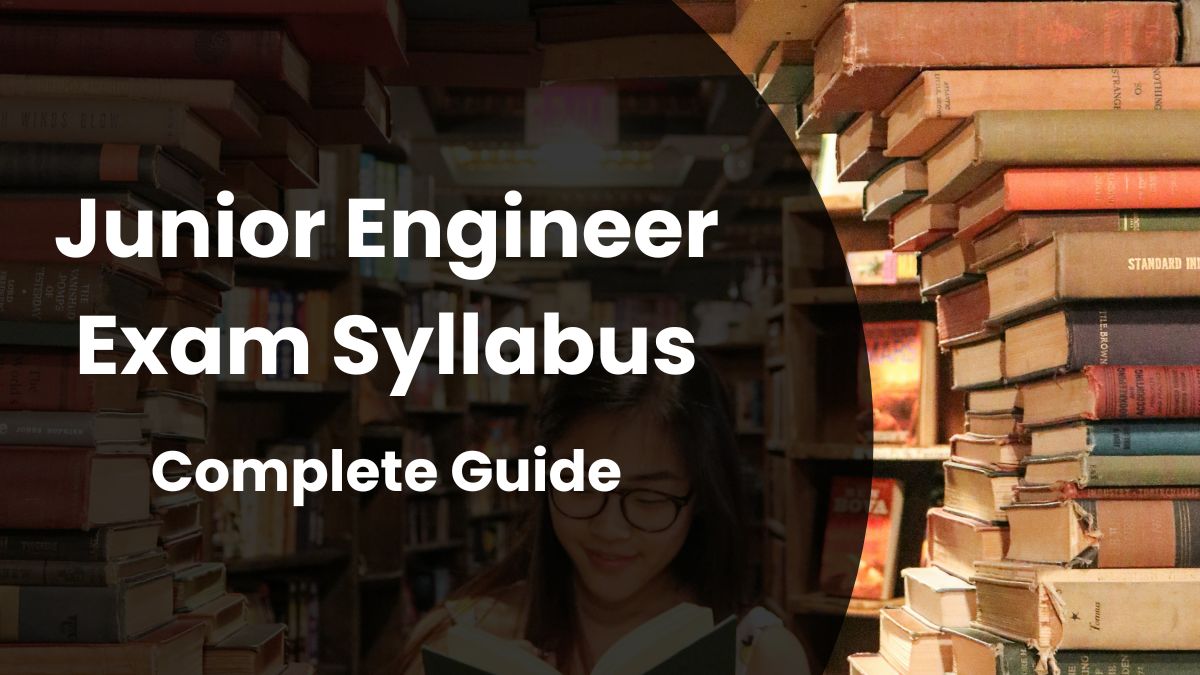The Junior Engineer (JE) exam is a prestigious opportunity for engineering aspirants to secure a government job. Various organizations like SSC, RRB and state-level commissions conduct the JE exam to recruit candidates for Civil, Mechanical, Electrical, and other branches of engineering.
This article covers the complete Junior Engineer exam syllabus and offers study tips for effective preparation. Whether you’re aiming for SSC JE, RRB JE, or a state-level exam, this guide will be useful.
Junior Engineer Exam Syllabus
The JE exam typically consists of two main sections:
- General Section (Common for all branches):
- General Intelligence & Reasoning
- General Awareness
- General Engineering (discipline-specific)
- Technical Section (Branch-specific):
- Civil Engineering
- Mechanical Engineering
- Electrical Engineering
- Other disciplines (if applicable)
The exam usually consists of multiple-choice questions (MCQs) and is divided into Paper I (Objective) and Paper II (Descriptive or Objective, depending on the exam).
Junior Engineer Exam Syllabus Detailed Breakdown
1. General Intelligence & Reasoning
This section assesses your logical and analytical reasoning. Key topics include:
- Analogies
- Coding-Decoding
- Number Series
- Classification
- Matrix Reasoning
- Puzzles
- Blood Relations
- Directions
- Logical Venn Diagrams
- Syllogism
- Data Interpretation
2. General Awareness
This section tests your knowledge of current events, general knowledge, and static GK. Important areas to cover are:
- Current Affairs (National and International)
- Indian History (Ancient, Medieval, Modern)
- Geography (Physical, Political)
- Indian Polity (Constitution, Preamble, Fundamental Rights)
- Economics (Budget, Five-Year Plans)
- Environmental Issues
- General Science (Basic Physics, Chemistry, Biology)
3. General Engineering
This section includes questions specific to your engineering discipline. Candidates must prepare for their respective branches.
Civil Engineering Syllabus
- Building Materials
- Surveying
- Soil Mechanics
- Hydraulics
- Environmental Engineering
- Concrete Technology
- Transportation Engineering
- Irrigation Engineering
- Structural Engineering
- Theory of Structures
- RCC Design
- Steel Design
Mechanical Engineering Syllabus
- Engineering Mechanics
- Strength of Materials
- Theory of Machines
- Thermodynamics
- Fluid Mechanics
- Heat Transfer
- Production Engineering
- IC Engines
- Refrigeration & Air Conditioning
- Machine Design
Electrical Engineering Syllabus
- Basic Concepts of Electrical Circuits
- Magnetic Circuits
- AC Fundamentals
- Electrical Machines
- Transformers
- Power Systems
- Control Systems
- Electrical Measurement
- Utilization of Electrical Energy
- Basic Electronics
Study Guidelines for Junior Engineer Exam
- Understand the Exam Pattern: Start by thoroughly understanding the structure of the exam. Focus on both objective and technical sections. Divide your time efficiently between technical and non-technical parts.
- Topic-wise Preparation:
- Break down the syllabus into manageable parts.
- Focus on completing one subject or topic before moving on to the next.
- Use topic-specific books and online resources.
- Use Standard Books:
- General Intelligence & Reasoning: R.S. Aggarwal’s Reasoning Book is a great resource.
- General Awareness: Lucent’s General Knowledge or Manorama Yearbook for current affairs.
- Engineering Subjects: Refer to standard textbooks used during your engineering course.
- Regular Practice:
- Solve previous year papers to understand the type of questions.
- Take mock tests and practice sets regularly to improve speed and accuracy.
- Time Management:
- Allocate time for each section based on difficulty level and your comfort.
- Focus more on your weaker areas, but don’t ignore your strengths.
- Avoid spending too much time on a single question during the exam.
- Revision:
- Regular revision is essential for retaining concepts.
- Make short notes for quick revision, especially for formulas, definitions, and concepts.
- Stay Updated:
- Keep up with current affairs for the General Awareness section.
- Regularly read newspapers or use apps like Adda247 or Gradeup for updates.
- Mock Tests and Online Resources: Many online platforms offer free mock tests and quizzes specifically for JE exams. These help in building your confidence and familiarity with the exam format.
The Junior Engineer exam requires a well-rounded preparation strategy that balances both technical and general sections. Understanding the syllabus and consistently practicing with previous year papers and mock tests will boost your chances of success.
Make sure to plan your study schedule wisely, focus on time management, and maintain a positive mindset during preparation. Good luck with your exam preparation!

